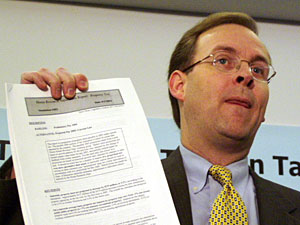Photos
Your Voice
| ||||||||||||||||||||||||||||||||||||||||||||||||
Politicians talk taxes on eve of filing deadline
April 14, 2004
 |
| House Minority Leader Matt Entenza, DFL-St. Paul, cited a March report documenting a 6.6 percent increase in property taxes due statewide, totaling $332 million. (MPR Photo/Michael Khoo) |
St. Paul, Minn. — If voters knew one thing about candidate Tim Pawlenty, it was probably this: he'd pledged that, if elected, he would not raise state taxes. And he says he'll hold to that pledge, despite last year's $4.5 billion deficit, despite this year's $160 million deficit, and despite projections that deficits will return for the budget cycle beginning in 2005. Pawlenty argues that the no-new-taxes promise is hardly extreme.
"Government budgets are going to grow," Pawlenty said. "They continue to grow, even as I've been governor. And they'll continue to grow in the future. What we're saying is we would like to have that growth reflect what's taking place in the rest of the economy and in the paychecks of Minnesotans."
 | |||
Pawlenty likes to note that -- contrary to popular belief -- he hasn't cut the overall level of state funding. In fact, it's grown. But critics say that the governor doesn't take into account inflation. And they also point out that while state spending may have increased slightly under Pawlenty's watch, it didn't go up nearly enough to provide the same level of services as in the past.
Eligibility for certain social programs has been scaled back, co-payments for state sponsored health plans have been raised, and state government has shed jobs.
Wayne Cox, who represents the labor-funded group Citizens for Tax Justice, says the Pawlenty vision is hardly a moderate response to tight fiscal times.
"No, no, this is a sea change. This is not tinkering around the edges," said Cox. "The people behind these changes are virulently anti-government. This an orchestrated effort to basically get rid of government."
Cox says the Pawlenty philosophy fits a particular conservative mold: block tax increases, starve government of revenue, and watch state programs wither on the vine.
David Strom, the president of the Taxpayers League of Minnesota, the group sponsoring Thursday's Capitol rally and the holder of Pawlenty's no-new-taxes pledge, says there's some truth to Cox's charge.
"Look, I believe that big government in and of itself is problematic. Therefore, if you could have big government, theoretically, for free, I'd say it's still a bad idea," Strom said.
Strom says he's opposed to more than just the costs of expanded government. He's afraid that as state programs grow, they intrude on private initiative. That, in part, is why Strom says he opposes using gambling money to tackle the current state deficit.
House Republicans have proposed authorizing a private casino in exchange for a portion of the gambling proceeds. And even governor Pawlenty has called for the state's Native American tribes to share their gambling profits. Strom says rather than feed more government spending with gaming dollars, the state ought to make do with less.
But Republican House Speaker Steve Sviggum says that after last year's deficit-reduction, state government is about as lean as it can be.
"We've probably reduced spending as far as we can go at this time. Can we become more efficient? Absolutely. But I think at this time maybe it's incremental movement," Sviggum said.
Although Republicans have long said the state faces a spending problem -- and not a revenue problem -- they're nevertheless seeking new revenues to erase the deficit. This year it's gambling. Last year, the governor's budget solution relied on hundreds of millions of dollars in new fees. And DFL critics say the governor's pledge to keep the lid on state taxes has only shifted the burden elsewhere.
House Minority Leader Matt Entenza points to a new report showing property taxes rose in Minnesota by more than 9 percent last year, and are likely to jump by almost seven percent again this year.
"Every time they open their mouths and say they haven't raised taxes, they're lying. Because people's taxes are going up, and they're going up because of the Republican budget cuts," according to Entenza.
Pawlenty, however, says he has no direct control over local property tax decisions. He says he's been able to stick to his principles on taxes and spending. He says there's no reason other officeholders can't do the same.
|
News Headlines
|
Related Subjects
|

